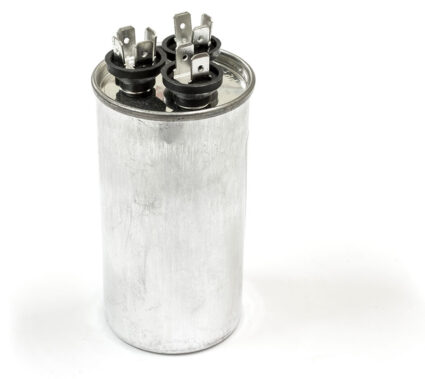What Does My Furnace Capacitor Do?
 Those of us in Aurora, Oswego, Plainfield, Naperville and Lisle (IL) all understand what a furnace is and what it does. However, we might not always give much thought to its inner workings and how different parts play vital roles in keeping us warm and safe in the cold.
Those of us in Aurora, Oswego, Plainfield, Naperville and Lisle (IL) all understand what a furnace is and what it does. However, we might not always give much thought to its inner workings and how different parts play vital roles in keeping us warm and safe in the cold.
A furnace’s main function is to move heated air from the unit into your home. It achieves this by means of a fan attached to a blower motor. The motor is what drives fresh air through the furnace, over the burners that heat it, and through your ducts to your rooms.
When the furnace is at rest, the blower motor is as well. When the thermostat calls on the blower to activate, the blower requires a charge to get moving. The furnace capacitor is a sealed part that resembles a small can. It stores and delivers the power to jump-start the blower. In this way, it functions much like a battery.
The effect a faulty capacitor can have on your heating system is clear. If the capacitor isn’t working, the furnace will not move heated air. The capacitor also cannot be repaired – it can only be replaced.
What Affects the Furnace Capacitor?
Capacitors are one of the most commonly replaced heating components in Aurora, Oswego, Plainfield, Naperville and Lisle. If you own your furnace long enough, you’ll likely replace your capacitor at least once.
A typical capacitor of decent quality is usually made to last for about as long as the average furnace unit, which can often be between 10 and 20 years. Along the way, however, certain factors can cause premature wear of the part. A few of them include:
incorrect voltage ratings. If the capacitor does not match the furnace’s voltage rating, it will lower the capacitor’s lifespan and possibly even lead to a system failure.
improper sizing and installation. A capacitor that is too small or installed with the wrong parts will usually not last long and eventually start to compromise the heating system.
too much heat exposure. If the capacitor is consistently exposed to external heat, it will become increasingly vulnerable to damage. For this reason, it’s important to limit the time the furnace spends in direct sunlight. This can be achieved by having the furnace in a location that provides some cover or shade.
Furnace Capacitor Trouble Signs
When something is amiss with the capacitor, your furnace will often speak in its own way. The following are signs it might give you to make you alert.
No power. A faulty capacitor will prevent the fan from turning and make the system halt. If your system is unresponsive, first check your circuit panel to see if the breaker might have tripped. If it did, switch it back on, increase the thermostat and see if the furnace turns on. If it doesn’t, there might be a capacitor problem.
Inconsistent blower motor. A failing capacitor can cause the blower to overheat or operate slowly or inconsistently. This means the capacitor isn’t holding the proper charge to start the blower. Be alert to any short or odd heating cycles.
Clicking sound. If the furnace makes a clicking sound when trying to start but the blower doesn’t move air or turn, it could be a failed capacitor.
Burning smell. An electrical burning odor can indicate the wires supplying power to the capacitor are frayed or corroded.
Humming sound. With a properly functioning furnace, the blower motor might hum a bit as it works up to full speed. If you hear a hum but the blower isn’t starting, something is holding back the fan or the blower. It could be an electrical problem or an obstruction caused by debris or a rodent.
System shutdown. Today’s furnaces include a thermal overload switch for a furnace that gets too hot. A failing capacitor can cause the whole unit to overheat, which may trip the safety switch and shut down the system.
If you notice a trouble sign, contact your heating professionals at Beery Heating and Cooling. The furnace also should not run for extended periods after you recognize a symptom, or wider system damage could result.
Unless you are properly trained, do not try to handle or replace a capacitor on your own, as the charge that it stores can result in an electric shock.
Here for Answers and Service
Beery Heating and Cooling enjoys serving Naperville, Aurora, Plainfield, Oswego and Lisle as a local resource for smarter, safer and more efficient heating at home. If you would ever like to discuss your furnace, including a possible issue with the capacitor, we’d be glad to hear from you and assist you. Just give us a call at (630) 585-6444!
We are available for furnace capacitor troubleshooting and replacement throughout the area, also including Yorkville, Plano, North Aurora, Montgomery, Batavia and Sugar Grove.
